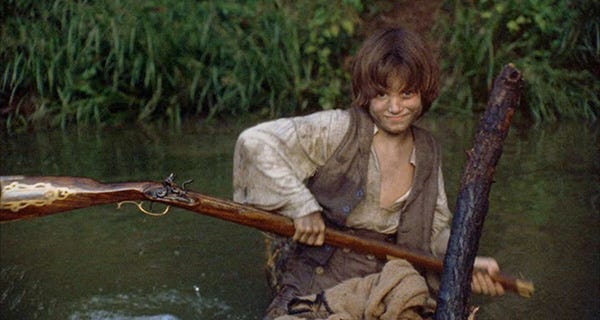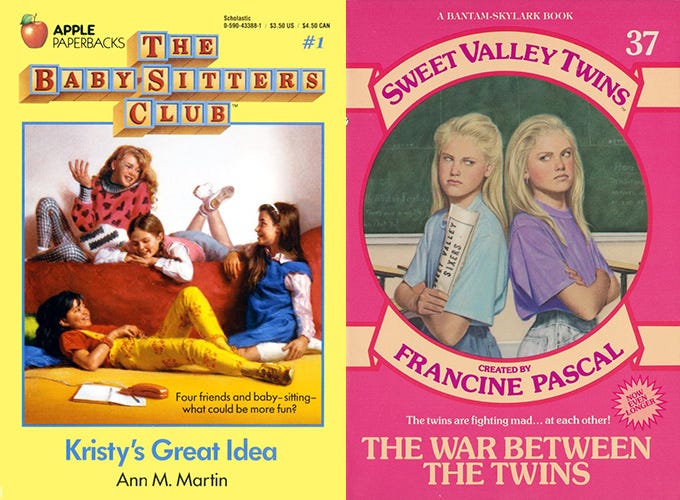Mental Getaways: How Escaping Into Fandom Feels Like Vacation Vibes
Can’t take a trip right this second? Take a relaxing journey into pop culture!
When I was a young kid, I discovered fandom. The source? The Disney Channel on cable. It was a real privilege to have access so it wasn’t lost on me just how special this was (and just how cool my parents were for subscribing to it). The first show I remember watching with religious dedication was the mid-80s sitcom Kids Incorporated.
The premise was simple: a youth rock group called Kids Incorporated would perform at the local music club. But in between shows they dealt with normal issues of being a teen: friends, crushes, peer pressure, and school. The singers who were kids just like me, I could emulate the dancers’ moves in my living room, I learned the words to the modern pop music covers…it was intoxicating. I loved forgetting about my school day and my homework for that half hour to get lost in my favorite show.
Later, as a preteen, the Disney Channel struck again: The Adventures of Huck Finn, a movie adaptation based on the Mark Twain classic, starred a blue-eyed boy I instantly fell in love with: future hobbit himself, Elijah Wood.
Before long I was walking down to the neighborhood stationary and card store to pick up teen magazines featuring stories about and photos of my new celebrity crush. And while taking a break from the oh-so-tough life of a fifth grader who hated math, I learned about other movies and shows in the pages of those magazines. Soon, my world was filled with entertainment content I loved to get lost in. I spent hours pouring over those magazines until my mom yelled up to my room that it was dinnertime.
At the same time, I was an avid reader, stocking up on Baby-Sitters Club and Sweet Valley Twins books whenever I got a few extra dollars in my allowance. I stayed up late reading every night and practically lived at the library to acquire more when I was old enough to walk there by myself. The worlds of these chapter books were extremely vivid, and I saw myself in these stories. (Incidentally on the covers of my BSBs I saw my neighbor from a few houses down the street from my house, who was a child model and posed for the drawings of several iconic covers. True story.)
At a young age I discovered what many people know: escapism is exhilarating, and fandom is an easy avenue to get there. Just a few short years ago, the world experienced a global pandemic–preventing real-life escapism via travel and vacations for a while. Fandom absolutely flourished in this time as people retreated into their virtual worlds, their screens, and books. Romance and other genre fiction quickly became the fastest selling amongst books sales, allowing fans of those genres to revel in their favorite tropes and fantasies. Physically, a date with a stranger might have been out of the question for a while, but finding love inside romance fandom was a salve for anyone working from home on never ending Zoom meetings or helping kids with virtual learning.
But this type of escape existed long before global shutdown. Escaping into our fandoms on an individual level offers a reprieve from daily life and can feel like self-care. Whether it’s reading a book in a particular genre you feel inspired by, or watching your favorite TV show for the 37th time, we feel comforted by these fandom activities. Rather than an exercise in nostalgia (though nostalgia has its comforting effects as well), rewatching a show or movie you have loved for years provides a mental safe space where you can visit characters or places that are calming and comfortable, like an annual visit to a family cabin on a lake might feel like in real life. Watching or reading something in a genre you’ve never tried can challenge you the way you might be challenged on vacation to try a new activity. And of course, we can escape to different places through content, using a book, movie, or TV show to discover places we’ve never been (and might not be able to go).
Escapism through content (if we can put our phones down for long enough to focus on it) can even result in being put into a kind of mental daze. How many of us have gone into a movie theater only to feel somewhat disoriented when the lights come up after the credits have rolled? Or get so invested in a book we are reading that we lose track of the time and stay up too late turning pages? I had a hunch that vacation disorientation feels somewhat similar, so I Googled “what happens to our brains on vacation?” and this fun fact popped up: the concept of “vacation brain.” Despite very little study about the phenomenon, professionals working in the travel and leisure industry have reported that vacationers also kind of check out (and no, that’s not a hotel-stay pun). Vacation brain refers to an instance where a vacationer might forget how things generally work (like elevators) or otherwise feel disengaged in the way they wouldn’t feel in their daily lives. The hypothesis is that forgetting simple things or not behaving the way you normally might actually frees your brain up for more creative pursuits and mental elasticity–which is exactly what you might want from a vacation experience. There is no question that we often try something new on vacation simply because we are out of our typical environments, like try a new food or wear something we normally wouldn’t. I feel like “vacation brain” is the cause of some of the more questionable souvenirs I’ve brought home from trips.
There’s no question that fandom and mental health go hand in hand. Community in fandom, specifically, has an enormous positive effect on mental health, “offering solace, camaraderie, and a sense of belonging to individuals across diverse backgrounds” according to a recent article from Psychology Today. Communing with other fans has a similar effect to going on vacation with your best friends or simply getting out of your own space: fandom communities help people combat loneliness and enlarge their perspectives about the world by creating relationships with others around a shared interest.
Fandom activities that come out of being part of a fandom community like creating art or fan fiction also have positive effects on mental health. When one engages in artistic expression, it fosters self-confidence and personal growth. Often, we talk about travel in the same way. Going on a vacation where you try something you’ve never done before–like snorkeling through a coral reef or hiking a mountain–is character-building and teaches us something either about ourselves or the world around us. Similarly, engaging in fandom expression can lead to important self-discovery.
Whether it’s an individual pursuit of fandom or a communal one, looking forward to engaging with it is also on par with looking forward to a vacation. And looking forward to an experience has proven mental health benefits. Planning a trip can help your mood just the way you might look forward to that few minutes of book reading on your commute home or a weekend plopped in front of your TB with lots of snacks. The ultimate mood lifter? Planning out that fandom vacation you are saving up for.
So go ahead, indulge in your fandom and call it a vacation for your brain. You’ll definitely find fellow travelers wherever you decide to go.
Want to find others to geek out with on your “fandom vacation”? Check out our Discord! You’ll find other fans there who are game to chat and who love the same stuff you do. And tell us in the comments which fandoms you love to escape to the most!
Want more? Our Discord is where you’ll find tons of other fans there chatting in our forums about the books, TV shows, movies, music, and games we all love! Don’t forget to follow us on Instagram, tumblr, and Spotify for more fandom content—and hit that subscribe button so you never miss a thing at rmrk*st!







